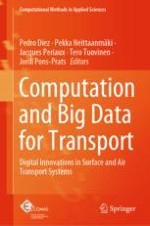2020 | OriginalPaper | Buchkapitel
7. A New Multi-objective Solution Approach Using ModeFRONTIER and OpenTrack for Energy-Efficient Train Timetabling Problem
verfasst von : Giovanni Longo, Teresa Montrone, Carlo Poloni
Erschienen in: Computation and Big Data for Transport
Aktivieren Sie unsere intelligente Suche, um passende Fachinhalte oder Patente zu finden.
Wählen Sie Textabschnitte aus um mit Künstlicher Intelligenz passenden Patente zu finden. powered by
Markieren Sie Textabschnitte, um KI-gestützt weitere passende Inhalte zu finden. powered by
